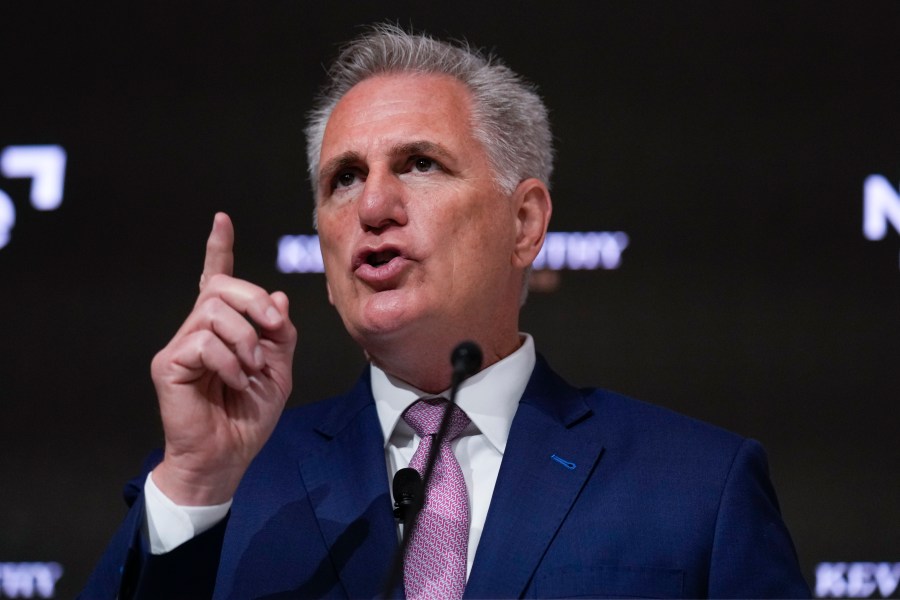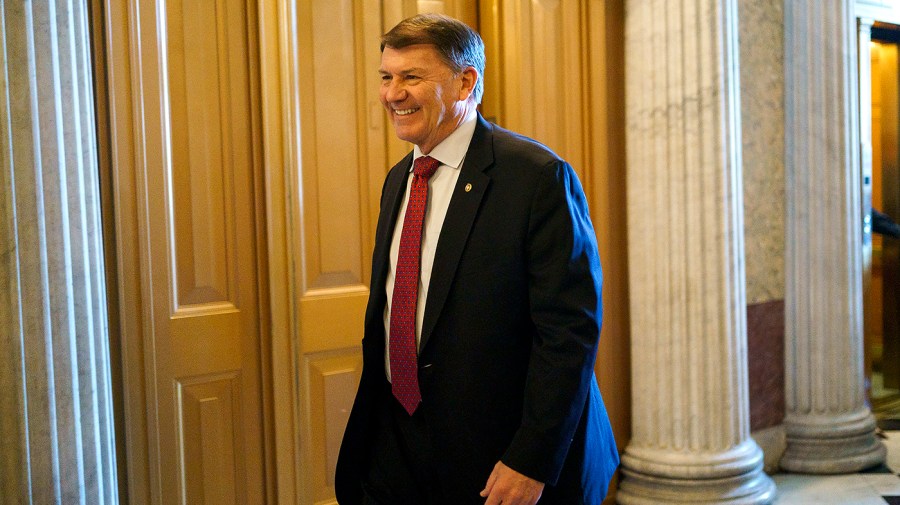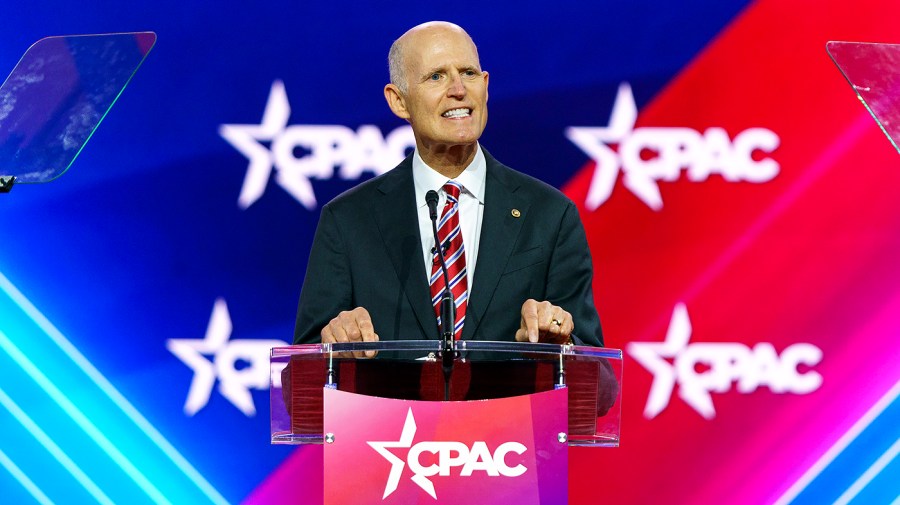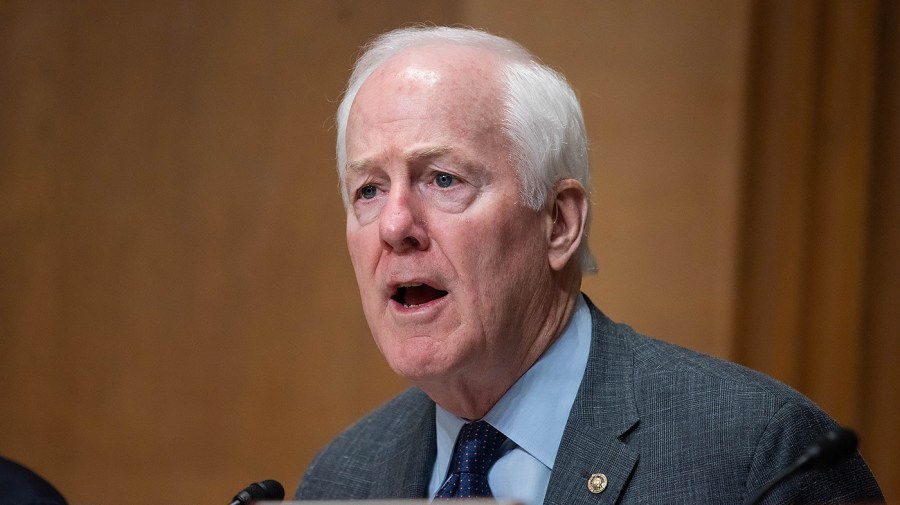Senate GOP bemoans McCarthy plan to punt debt ceiling to election year
Senate Republicans are trying to maintain solidarity with Speaker Kevin McCarthy (R-Calif.), but they are not thrilled with his proposal to extend the debt ceiling for only a year, setting up another standoff that could rattle the stock markets a few months before Election Day.
Senate Republicans think they have a good chance of winning back the upper chamber, but another high-stakes showdown with the president over the economy right before the 2024 election is politically risky.
“My complaint is that we delay these things all the time. Can we get out of moving from crisis to crisis?” said one Republican senator. “I’m for striking a deal and changing the spending, but can we not do it every year?”
Many GOP senators also aren’t enthusiastic about the prospect of capping or cutting defense spending, which could be required to achieve McCarthy’s promised rollback in spending to fiscal 2022 levels.

Speaker of the House Kevin McCarthy speaks during an event at the New York Stock Exchange in New York, Monday, April 17, 2023. McCarthy is hurtling toward one of the most consequential weeks of the new House Republican majority as he labors to pass a partisan package that would raise the nation’s debt limit by $1.5 trillion in exchange for steep cuts that some in his own party oppose. (AP Photo/Seth Wenig, File)
And they have stayed quiet about projections that the House Republican plan would result in a 22 percent cut in non-defense discretionary spending programs to protect the Defense Department from steep cuts.
The senator predicted that capping discretionary spending at fiscal 2022 levels would be “problematic for the House and the Senate and the White House.”
Senate Republicans have a good chance of winning the majority next year when 23 seats controlled by Democrats or Independents who caucus with Democrats will be up for reelection.
Steep spending cuts would give Democratic candidates plenty of political ammo.
Senate Republicans want to rein in federal spending, but they also hope to get past the danger of a national default without inflicting too much damage on the economy, which may be teetering on the brink of a mild recession.
The standoff over the debt limit has frozen the annual appropriations process because Senate and House leaders are nowhere close to reaching a deal on setting the top-line spending numbers for defense and nondefense programs.
“I think the debt limit provides us an opportunity to talk about our fiscal well-being, but I don’t want to see us be put in a position to where we fail to meet our obligations to pay our debt,” Sen. Mike Rounds (R-S.D.) said.

Sen. Mike Rounds (R-S.D.) arrives to the Senate Chamber for a vote regarding a nomination on Wednesday, March 15, 2023. (Greg Nash)
Rounds acknowledged not feeling good about the prospect of setting up another debt fight in 2024.
“Welcome to the United States Congress. Do I wish we could fix this thing once and for all? The answer to that is yes. Is this going to do it? Clearly not. Not at this stage of the negotiations,” he said.
Added Senate Republican Whip John Thune (R-S.D.), “These debt-limit debates are never fun; nobody wants to do it.”
“We’ll see what the House sends us; figure out how to process it,” he said.
But views on McCarthy’s proposal are mixed in the Senate Republican conference. A group of Senate conservatives led by Florida Sen. Rick Scott (R) applauded McCarthy when he announced his 11-month debt ceiling extension.
“It is a courageous first step toward a better and more prosperous America. There is a strong, conservative Republican Party all across America that is demanding action to put our nation back on the path to fiscal sanity,” Scott said in a joint statement with Sens. Mike Lee (R-Utah), Ron Johnson (R-Wis.) and Mike Braun (R-Ind.).

Sen. Rick Scott (R-Fla.) speaks during the Conservative Political Action Conference (CPAC) at the Gaylord National Resort and Convention Center in National Harbor, Md., on Thursday, March 2, 2023. (Greg Nash)
The last time Congress voted to raise the debt limit in late 2021, Senate Republicans battled bitterly over party strategy behind closed doors.
Senate Republican Leader Mitch McConnell (Ky.) devised a strategy to give Democrats, who also controlled the House, a one-time opportunity to advance debt limit legislation without having to overcome a filibuster, so he and Republicans could argue that Democrats added to the national debt entirely on their own.
But the one-time change to Senate procedure needed to be adopted with 60 votes, and few GOP senators were willing to take the political risk of making it easier for Democrats procedurally to raise the debt ceiling.
Only 14 Republicans, including McConnell and members of his leadership team, voted for the expedited process, and they immediately came under scathing criticism from former President Trump. Three of them — Sens. Roy Blunt (R-Mo.), Richard Burr (R-N.C.) and Rob Portman (R-Ohio) — already announced they were not running for reelection.
Although Republican senators aren’t eager to embrace McCarthy’s proposal, they don’t want to do anything to undercut him and give President Biden more leverage in the talks.
“The devil is going to be in the details. We haven’t looked at this 350-page bill and, honestly, right now for members of the Senate on the Republican side, we’re much better off if we just keep our powder dry,” Rounds said. “He’s still going to have to negotiate with the president. All we can do is muddle the waters.”
Sen. John Cornyn (R-Texas) said McCarthy probably would prefer a longer-term debt deal but needs to put together something that can muster 218 votes to pass the House. Otherwise, Republicans have little leverage with Democrats.
“I’m sure it’s not his first choice, but whatever it takes to get to 218 is the most important thing,” Cornyn said.

Sen. John Cornyn (R-Texas) is seen during a Senate Finance Committee hearing to discuss the President’s FY 2024 budget for the Internal Revenue Service on Wednesday, April 19, 2023. (Annabelle Gordon)
Sen. Susan Collins (R-Maine), the top Republican on the Senate Appropriations Committee, who voted for last year’s $1.7 trillion omnibus package, declined to say whether she would support reversing the spending increases Congress approved last year.
Instead, she said House passage of McCarthy’s proposal to raise the debt limit through March 2024 and cap spending at fiscal 2022 levels will help bring Democrats to the negotiating table.
“I’ve been following it and had a good meeting with the Speaker to find out what his plans were,” she said, noting the House plans to vote on the package this week.
“I hope it will spur further negotiations by the White House,” she added. “The fact that the Speaker has put out a specific plan takes away any further excuse that the White House had to not sit down and negotiate.”
McCarthy’s proposal would raise the debt limit through March 2024 or by $1.5 trillion, whichever comes first.
It would cut federal spending to fiscal 2022 levels and then cap annual spending growth over the next 10 years at 1 percent.
It would claw back the unspent COVID-19 relief money Congress enacted in 2020 and 2022 and block Biden’s student debt forgiveness plan.
House Republican leaders say the spending cuts would focus on nondefense discretionary spending and that they haven’t talked about reducing defense spending.
But at a press conference earlier this year, Senate Majority Leader Chuck Schumer (D-N.Y.) said Democrats, who control the Senate and White House, would insist on parity between defense and nondefense programs, which means the Pentagon would likely see a budget cut if McCarthy’s plan passes the House and prompts a broader discussion.
Senate Republicans — including McConnell — say they don’t want to cut the defense budget, which saw a 9.7 percent increase in last year’s omnibus spending bill.
“I do not think that we should be talking about cutting the defense budget at all right now. If anything, substantial defense increases,” Sen. Tom Cotton (R-Ark.), a McConnell ally and leading defense hawk, told The Hill earlier this year.
Updated at 11 a.m.
Copyright 2023 Nexstar Media Inc. All rights reserved. This material may not be published, broadcast, rewritten, or redistributed.

